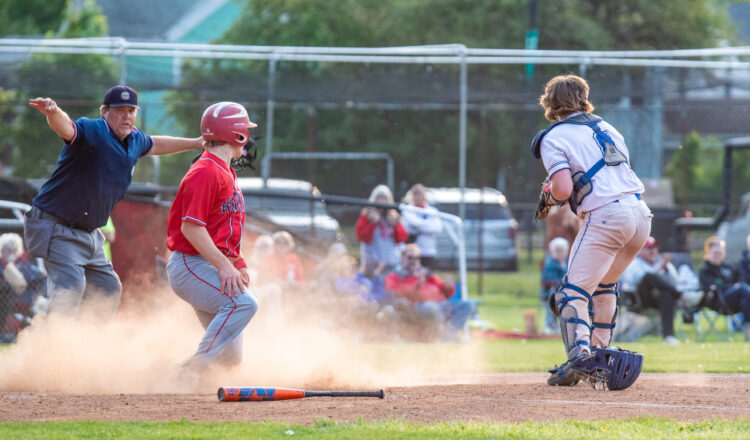A guest column for the Sun by Bob Lonsberry
This is for the Hornell catcher.
On the upside, you’re the most talked about high school athlete in the nation.
And on the downside – there is no downside.
You’re a member of an excellent team, with a noble coach, representing a great school. You’re a Red Raider and a ballplayer in a town that values both. And in one moment on one play you did what probably 70% of athletes your age would have done.
And you learned a lesson that will make you a better man for the rest of your life. Further, that lesson has been learned by millions of others who watched a snippet of video, and by untold others who may one day hear this story retold by you yourself.
It hurts today, but it will make you stronger and better tomorrow. Today you wish you had that patch; tomorrow you will be glad you had that experience. Because the worst days teach the best lessons. And learning is why young men and women play high school sports.
The things you learn on the playing field, when emotions are high but stakes are low, build character. They establish a framework of experience upon which you build a life. They are a metaphor for what counts. And ultimately, if we are wise, we learn as much from losing as we learn from winning.
So what did you learn?
First, that the test doesn’t come when you’re fresh. All of us looking in saw a snippet of video, two pitches at the end of a full game. It was hot and emotions where high and you and your teammates had played a nearly complete game of excellent baseball. You had hit and caught and run and thrown. You fought the fight, and the curve ball came when you were a little worn, and when you didn’t expect it.
Life is like that.
Second, you got mixed signals. Life is like that, too. The umpire wasn’t wrong, but he wasn’t right either. His job was to inform the athletes of the status of play, he did that, kind of, but not immediately and not verbally. And you didn’t know it, and you made an assumption, and his failure to communicate and your failure to comprehend combined to give the others guys the opportunity to win. That’s kind of his fault, and kind of your fault.
And maybe that’s the third lesson – nobody’s perfect. He did his best, and you did your best, and nobody’s perfect. And sometimes things just happen. And you can’t beat yourself or anybody else up. So you forgive the umpire for being human, and you forgive yourself for being human.
That’ll be important to remember later in life, when the stakes are higher and the disappointments are greater.
Something else America saw in the video was the celebration, your charge to the pitcher, your teammates coming out of the dugout, young men piling on one another, exultant. Sure, it was mistaken, but it was genuine, and it was the celebration of a team, a group of brothers, happy for one another and with one another. That’s a priceless thing, and it’s not diminished by finishing second at Sectionals. You don’t have the trophy, but you do have each other, for the rest of your lives, and that’s a whole lot better.
There was also in the video the second baseman. The Hornell Red Raider who correctly read the play or saw the umpire signal “safe.” The young man running toward home trying to get everyone’s attention. He will stick forever in the memory of you and your teammates as a reminder that things are not always as they appear, and that you must pay attention to different views and different voices, just in case.

The final lesson isn’t on the video, it’s in your reaction. The day of the game, today, tomorrow, the rest of your life. Do you hold your head up, or do you keep your spirit down? Do you learn and grow from this, or do you let it wound you? Does it sharpen you, or dull you?
Finally, you should recognize that though this was the big game, it was really just practice. Fate and Providence have a tendency to teach us what we particularly need to know, to train us for the tasks we will face. And here’s what they have just done for you: They have made sure that, for the rest your life, you will not assume anything, you will verify everything, you will pay attention to detail, even under great pressure, and you will never be caught in a trap of uncertainty again.
When you were a teenaged kid in your school colors, you got confused on a weak call at home, and the other team went home champions. That hurts, and it lit up the Internet, and it’ll be a story to tell. But it doesn’t really mean anything.
Later on in life, when things are for real, as a young man who once touched the hot stove, you’ll be ready for what comes, and that day, you will win.
And this day will be worthwhile.
Because the worst days teach the best lessons.

Bob Lonsberry, a Canisteo native, is the father of nine children, a veteran of the United States Army, and a newsman for nearly three decades. The former newspaper columnist, reporter, and author, is a marathon runner. You can hear Bob mornings on NewsRadio WHAM 1180 in Rochester and NewsRadio 570 WSYR and 106.9 FM in Syracuse. You can reach him at bob@lonsberry.com







